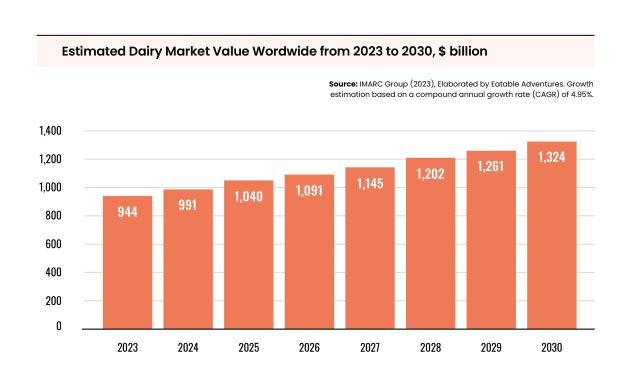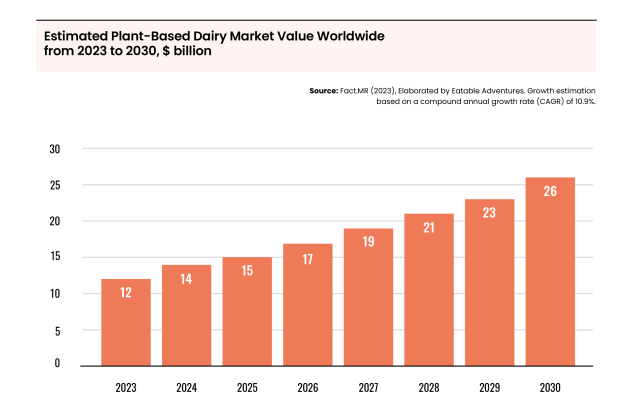With Australia’s dairy sector experiencing global market volatility, record farmgate milk prices, and rising costs, Foodtech accelerator Eatable Adventures’ report into the future of the industry is timely. Technology is having a transformative impact while hybrid products, sustainability initiatives, and strategic innovation partnerships are on the rise.
The global dairy industry, valued at US$944 billion in 2023 according to data from IMARC Group, is projected to grow to US$1.3 trillion by 2030, with a compound annual growth rate (CAGR) of nearly five per cent. Over 80 per cent of the world’s population consumes dairy products regularly, with global milk production surpassing 950 million metric tons in 2023.

Facing challenges such as climate change, labour shortages, fluctuating prices, and evolving consumer demands, the dairy industry is adopting innovative strategies to ensure its sustainability and competitive edge. Currently, the dairy industry is playing a leading role in advancing technology and innovation within the food sector, positioning itself as a central force in promoting food sustainability and resilience.
Agribusiness banking specialist, Rabobank, reported Australia’s milk production is continuing to recover after a troubled few years, and global supply is forecast to grow at a modest rate in the coming year.
India leads the global rankings for annual fluid milk consumption, surpassing the European Union and the United States by more than three times in 2023. Despite traditionally lower dairy consumption in East Asia, China has increased its milk production by nine million metric tons over the past decade, as well as being the world’s largest dairy importer.
However, Rabobank expects demand for milk to decline in China, with domestic milk production forecast to decline by 0.5 per cent year on year in 2025, as economic pressure on farms mount in the face of tumbling Chinese farmgate milk prices.
Plant-based dairy: scaling up technologies
A major focus of the Future of Dairy report is the consolidation of plant-based alternatives in the dairy market. Plant-based milk options, including soy, oat, coconut, and nut-based products, have become mainstream, reflecting shifts in consumer preferences and a greater emphasis on sustainability.

Valued at US$12.6 billion in 2023, the global plant-based dairy market is projected to double to around US$26 billion by 2030, with an anticipated CAGR of nearly 11 per cent. Despite this growth, traditional dairy products still hold the majority share of consumer preferences, with more than a third of consumers trying plant-based alternatives for the first time since 2020.
The Asia-Pacific region leads in plant-based dairy sales, far outpacing North America. Although many companies in Australia are looking into plant-based dairy and innovating in the area, alternative protein think tank, Food Frontier, found comparing funding for alternative proteins from 10 governments around the world puts Australia in last place.

Investment in plant-based dairy peaked in 2020-2021 but declined by over 90 per cent in the subsequent two years. Nonetheless, the category has matured, with more focus on later-stage investment rounds, indicating a move toward scaling up technologies and improving product quality, particularly in terms of nutrition and taste.

Technologies such as precision fermentation and cell-based methodologies have captured the spotlight, both for their potential as alternative dairy solutions and for the media coverage they receive. Meanwhile, emerging techniques like molecular farming, plant-cell fermentation, and computational biology are quickly gaining momentum, poised to further revolutionise the dairy landscape.
Open innovation and collaboration
According to the companies interviewed in the Future of Dairy study, consumer behaviour emerges as the primary concern for the dairy sector, as it contends with rising production costs and shifting consumer preferences.
Hyperinflation has driven up dairy prices, prompting many consumers to opt for more affordable white-label products. Moreover, younger generations, particularly millennials and Gen Z, are increasingly focused on sustainability and health, influencing their dietary choices and creating new challenges for traditional dairy producers.
Unsurprisingly, the industry is also grappling with sustainability and climate change. Reducing greenhouse gas emissions and enhancing sustainability practices are now top priorities for many dairy companies. The sector is working to develop guidelines and policies to address these environmental concerns while also adapting to the broader impacts of climate change on dairy farming.
Industry leaders assert that competition presents a primary challenge, originating not just from within the traditional dairy sector but increasingly from innovative startups. In this framework, collaboration among players and the implementation of open innovation tools present an opportunity to explore and overcome competitors who become collaborators.
In this challenging landscape, the industry seems divided between those who view the new technologies used in the creation of alternative dairy products as innovations limited to the laboratory and those who are open to adopting them as a new source of diversification.
The report highlights the growing trend of collaboration between corporations, startups, universities, and research centres, which is becoming a cornerstone of open innovation in the dairy industry.
These partnerships allow companies to access external knowledge and talent, driving technological advancements and improving sustainability efforts. Beyond product development, these collaborations also address broader sustainability goals, encompassing economic, social, environmental and nutritional dimensions.
However, aligning the interests and goals of corporations and startups can be challenging due to differences in organisational culture, scale, and strategic priorities. A key obstacle is the differing timelines for development and market entry.
Eatable Adventures founder and CEO, José Luis Cabañero, said these partnerships enable startups to scale faster while providing corporations with efficient access to new technologies.
“Success in the sector depends on the ability to scale emerging technologies, achieve price parity, and meet evolving market demands,” said Cabañero.
“This report outlines our vision for a technology-driven future for the food sector, where innovation not only positively impacts the planet but also promotes industry best practices and benefits consumers.
“Industry leaders must actively shape the future rather than merely observe it. We call on all stakeholders involved in this transformation to adopt forward-thinking practices and integrate cutting-edge technologies that enhance sustainability and efficiency,” he said.
For more information, the full findings of the Future of Dairy report can be read here.






